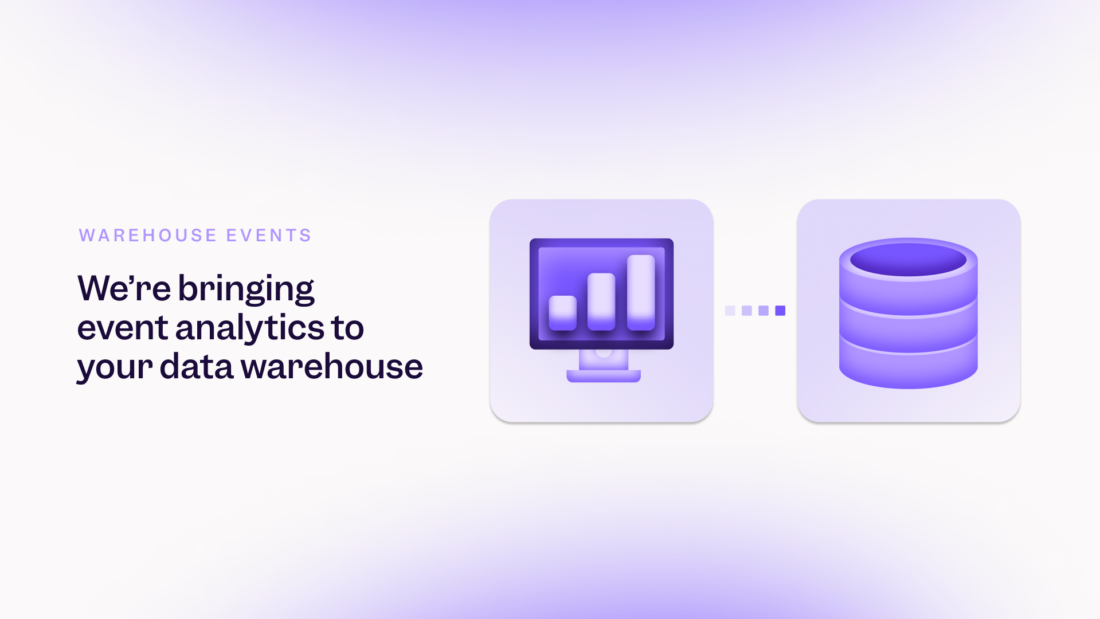
We’re bringing event analytics to your data warehouse
Mixpanel’s Warehouse Connectors feature makes it easier than ever to bring the power of self-serve event analytics to all your business data.

Most of the data our customers analyze in Mixpanel is from user behavior. But when you add in data from across the company—on revenue, customer profiles, etc.—Mixpanel can deliver much deeper insights to help direct wider decisions about the business. We’ve introduced Warehouse Connectors to make it easier to bring in all that extra data.
With Warehouse Connectors, you can natively connect Mixpanel to tables in your data warehouse so our powerful self-serve analytics Boards and reports can bring in all your company’s most trusted data.
Historically, organizations have faced two big challenges when analyzing their data:
- As touched on above, event analytics tools have traditionally had product usage data and lacked data about the company’s business. So despite the advantages of speed and usability of these self-serve analytics tools, this predicament left analysts with an incomplete picture of what happened and created discrepancies between product tracking and systems of records for key events.
- Critical business data (support tickets, opportunities created, revenue transactions) already lives in data warehouses and other systems of record. But while this data is theoretically available for analysis, it’s not actually accessible to most people because analysis typically requires a technical stakeholder to run a SQL query. Data teams inadvertently become bottlenecks and limit the impact of analyzing this additional data.
With Mixpanel Warehouse Connectors, we beat that tradeoff. You can bring in all the company data you already collect in your data warehouse to Mixpanel. But you can also leverage enriched data that is modeled by your data team in your warehouse to analyze all aspects of your business, enabling the speed and usability benefits of Mixpanel without worrying about data discrepancies.
Why event analytics is the way forward
You can provide metrics to your company in two ways currently.
- Simple, but siloed: dedicated analytics within specific SaaS tools like Salesforce
- Unified, but complex and slow: centralize the data in a data warehouse, transform it into metrics, and put a BI tool on top
This is a no-win situation. Either all your data is siloed in disparate tools, or every time someone wants to track a new metric or slice the data in a new way, the data team has to build new tables and dashboards.
Virtually anything that happens in a business can be captured as events.
Event analytics beats this tradeoff. It uses a simple data model. There are events corresponding to things that have happened, and there are profiles (dimensions) that correspond to users, accounts, and the like. Because this model is so generic, virtually anything that happens in a business can be captured as events. For example, most systems have transaction logs that can be easily mapped to events, and any table with a timestamp field can be modeled as events. So event analytics can be used to answer not just product usage questions, but also marketing, revenue, and sales questions.

Having data relevant to so many aspects of the business naturally breaks down silos and opens up the ability to answer questions spanning multiple areas, like tying marketing campaigns all the way to purchase and sales conversion or easily calculating how many users file a support ticket within a week of signing up. Another advantage is that event analytics is more intuitive. People tend to think about the world in terms of a series of events that occur. That makes ad-hoc querying much more natural than SQL, for example, and makes event analytics truly self-serve.
Going beyond product data
You may already use Mixpanel for analytics on your product data. But if you’re among the many companies centralizing data from all of your systems in a data warehouse, syncing at least some of that data into Mixpanel has real advantages.
First, you can increase the trustworthiness of your data by creating events from systems of record wherever possible. For example, you can use your user authentication table to create signup events, or you can more easily reload historical events every now and then with data quality fixes or additional event properties. You can also bring in data that is more easily available from internal systems. For example, you can add purchases with associated revenue that your sales team has closed.
We use Mixpanel on Mixpanel for all of this analysis. Click the image below to explore an example of our revenue analytics Board:

We’re excited to arm you analytics on more of your company data so you can build smarter. Learn more about getting started with Warehouse Connectors here.
Let’s build—with more data 🛠️
Gain insights into how best to build for your users and your business with Mixpanel’s powerful event analytics. Try it free.





